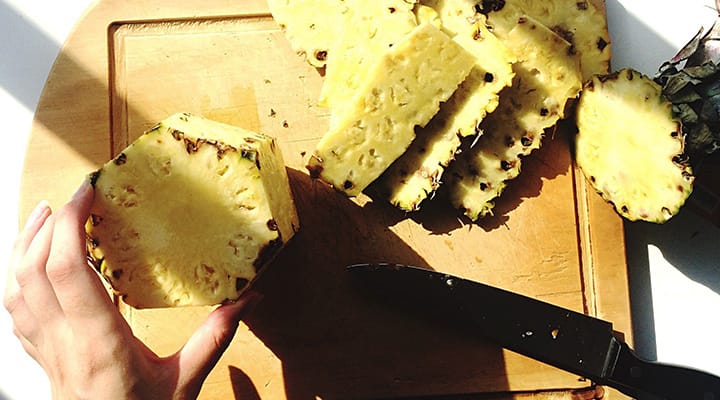
Bromelain Supplements: How Should I Take Them?
Published: February 2023
Mother Nature sure got it right when it comes to pineapple. Now don’t get us wrong—all types of plants, fruits, and vegetables contain nourishing and health-promoting properties that can make you feel better mentally and physically. But the spiky-textured, delightfully-scented and sweet-tasting tropical fruit packs a particularly powerful punch, in part because it contains something called bromelain. This enzyme benefits your body from head to toe, and from breathing to belly.
So, add some pineapple to your morning smoothie, pull up a chair, and learn the ins and outs of this powerhouse enzyme extract—plus, the best way to take bromelain supplements (which offer some distinct advantages over trying to get this nutrient from diet alone).
What is bromelain?
Bromelain—also called pineapple enzyme, pineapple extract, or pineapple plant (ananas comosus, in Latin)—is a group of enzymes present in the fruit and stems of, you probably guessed it, the pineapple plant! (And a few other foods—which we’ll get to shortly!) While it’s native to America, you can find it growing worldwide in tropical and subtropical climates.
In the past, people native to Central and South America used pineapple for all sorts of health needs, including digestion (like occasional bloating) and to encourage a healthy inflammatory response. So, it’s no surprise that today, you can supplement with bromelain and enjoy a number of health benefits.
Speaking of which…
Benefits of supplementing with bromelain
While research is ongoing, science has certainly found that bromelain offers a variety of health benefits as a dietary supplement. (It’s also much more convenient to consume than trying to make a pineapple stem, well, edible!)
For instance, one review of clinical studies concluded that bromelain supports a healthy inflammatory response and promotes overall body health and comfort. For this reason, some healthcare professionals suggest eating pineapple to promote healthy tissue.
Most of bromelain’s other benefits also can be traced to its ability to promote a healthy inflammatory response. These include:
- Comfortable movement: Some studies have found that bromelain benefits your joints.
- Breathing easy: Bromelain helps support healthy breathing, particularly open airways. Along similar lines, emerging evidence suggests that bromelain supplementation may support nasal health.
- Healthy digestion: Furthermore, because bromelain helps inhibit inflammation to support whole-body health, it can have a positive impact on digestive health, comfort and regularity. Bromelain is an especially popular supplement among people who want to support their digestive tracts. Bromelain helps your body digest protein, and it also helps support production of digestive enzymes.
Psst! Not sure which nutrients you should be taking to promote a healthy inflammatory response? Head over to our quiz and find out.
How to take bromelain supplements
It’s best to follow the dosage recommendation on the product. For instance, the serving size for Life Extension’s pineapple-derived, plant-based Specially-Coated Bromelain is one tablet, which gives you 500 mg of bromelain proteolytic enzyme extract from pineapple in a single dose. Some supplements will split the total dosage into three or four tablets of smaller amounts of bromelain.
Should you take bromelain on an empty stomach or with food? Again, check the label. A general rule of thumb: if you’re using it to support a healthy inflammatory response, then you can take it on an empty stomach. Bromelain supplements that are formulated to support healthy digestion may recommend taking your doses prior to your heaviest meals of the day.
Can I take bromelain with other supplements?
The short answer is yes, you can combine bromelain with other supplements! If you have any doubts that it’s a safe addition to your lifestyle, consult your healthcare provider first to see if there are any concerns and what dosage makes the most sense for you.
If you’re using bromelain as a digestive enzyme, then you’ll often find that in a single supplement, it’s paired with other digestive enzymes that complement it nicely. For example, Life Extension does this with Enhanced Super Digestive Enzymes and Enhanced Super Digestive Enzymes with Probiotics. They both contain 10 vegetarian-friendly enzymes perfect for digestion, including lactase, protease, cellulase, and lipase. The latter also includes probiotics, which further help you maintain a healthy gastrointestinal balance. (Customers often pair this with a prebiotic!)
In the case of our Specially-Coated Bromelain, the bromelain is formulated so that it won’t act as a digestive enzyme. This way, it actually bypasses the stomach to retain its benefits, including promoting a healthy inflammatory response. You also might want to consider taking other supplements along with it, like curcumin or other joint health-promoting nutrients, that’ll complement the bromelain and more holistically support a healthy inflammatory response.
Finally, if you’re taking bromelain to support your heart health, it’s worth noting that there’s recent research showing that a combination of bromelain, hawthorn, and tart cherry can help support cardiovascular health. (One caveat: The study didn’t isolate bromelain from the other two components, so we can’t really know how much their addition helped deliver these results.)
Explore Our Best Inflammation Health Support Supplements
Are you getting enough bromelain in your diet? 3 foods that contain bromelain
You already know one of the most common sources of bromelain, but let’s talk more about what foods you can munch on to get even more of it.
- Pineapple: Consuming the flesh or the juice is a great way to get a dose of bromelain. Note that bromelain is sensitive to heat, so eating it in baked goods, for example, won’t get the job done. Eat it plain, or add it to your probiotic yogurt for a gut-healthy digestive boost. Not hungry? Drink some pineapple juice to enjoy its many health benefits.
- Bananas: Bananas are another easy fruit to consume since there are so many ways to prepare them! Peel one and go to town, add it to your smoothie, freeze and blend it to make banana “nice cream,” or chop it up and put it in your cereal or oatmeal.
- Cucumber: You might put a couple of slices on your eyelids after a late night as a form of self-care. But you should also consider adding them to a salad or munching on them as a snack with some hummus.
In a perfect world, we get all of the vitamins, minerals, and nutrients we need from food alone. However, you don’t need us to tell you that we don’t live in a perfect world. Supplementing with bromelain is a fantastic addition to your other healthy lifestyle habits!
Don’t forget, too, that if you’re looking for a digestive enzyme specifically, bromelain isn’t your only option, and neither are pineapples. Some healthy foods that also contain digestive enzymes include:
- Papayas, which contain a digestive enzyme called papain
- Avocados, which contain lipase
- Sauerkraut, which picks up a variety of digestive enzymes during the fermentation process
- Kefir, which is a fermented milk drink containing lactase
- Mangoes (amylase)
- Honey (amylase and protease)
Bromelain is an excellent dietary supplement to help digestion and promote a healthy inflammatory response. If you’re already including bromelain-rich foods—like pineapple or pineapple juice—in your diet but need a little extra support, that’s where supplementation comes into play. Talk to your healthcare provider to find out if a bromelain-containing supplement is right for you and what dose you should be taking.
Remember that supplements are not a replacement for healthy habits—they enhance them! In order for your bromelain supplement to have the biggest impact, combine it with a nutrient-dense diet, sufficient hydration, physical activity, and plenty of sleep.
References
- Brien, Sarah, et al. “Bromelain as a Treatment for Osteoarthritis: a Review of Clinical Studies.” Evid Based Complement Alternat Med. December 2004. https://www.ncbi.nlm.nih.gov/pmc/articles/PMC538506/
- Hertzler, Steven R, et al. “Kefir improves lactose digestion and tolerance in adults with lactose maldigestion.” J Am Diet Assoc. May 2003. https://pubmed.ncbi.nlm.nih.gov/12728216/
- Hikisz, Pawel, et al. “Beneficial Properties of Bromelain.” Nutrients. December 2021. https://www.ncbi.nlm.nih.gov/pmc/articles/PMC8709142/
- Kwarta, Bharat. “A Review on Potential Properties and Therapeutic Applications of Bromelain.” World Journal of Pharmacy and Pharmaceutical Sciences. November 2019. https://www.researchgate.net/profile/Bharat-Kwatra/publication/337745347_A_REVIEW_ON_POTENTIAL_PROPERTIES_AND_THERAPEUTIC_APPLICATIONS_OF_BROMELAIN/links/5de819cea6fdcc2837067265/A-REVIEW-ON-POTENTIAL-PROPERTIES-AND-THERAPEUTIC-APPLICATIONS-OF-BROMELAIN.pdf
- Pekas, Elizabeth J, et al. “Combined anthocyanins and bromelain supplement improves endothelial function and skeletal muscle oxygenation status in adults: a double-blind placebo-controlled randomised crossover clinical trial.” Br J Nutr. January 2021. https://pubmed.ncbi.nlm.nih.gov/32660675/
- Secor Jr, Eric R, et al. “Bromelain exerts anti-inflammatory effects in an ovalbumin-induced murine model of allergic airway disease.” Cell Immunol. September 2005. https://pubmed.ncbi.nlm.nih.gov/16337164/
- Wu, Arthur W, et al. “Alternative therapies for sinusitis and rhinitis: a systematic review utilizing a modified Delphi method.” Int Forum Allergy Rhinol. April 2020. https://pubmed.ncbi.nlm.nih.gov/32104974
- Zhou, Zijuan, et al. “Inhibition of Epithelial TNF-α Receptors by Purified Fruit Bromelain Ameliorates Intestinal Inflammation and Barrier Dysfunction in Colitis.” Front Immunol. November 2017. https://pubmed.ncbi.nlm.nih.gov/29176974/
- “Bromelain.” National Center for Complementary and Integrative Health. https://www.nccih.nih.gov/health/bromelain
- “The Many Health Benefits of Pineapple.” Cleveland Clinic. October 2022. https://health.clevelandclinic.org/benefits-of-pineapple
Like what you read?
Please subscribe to get email updates on this blog.








